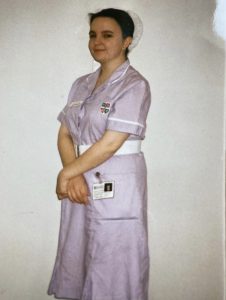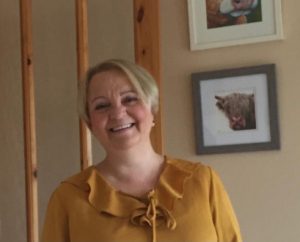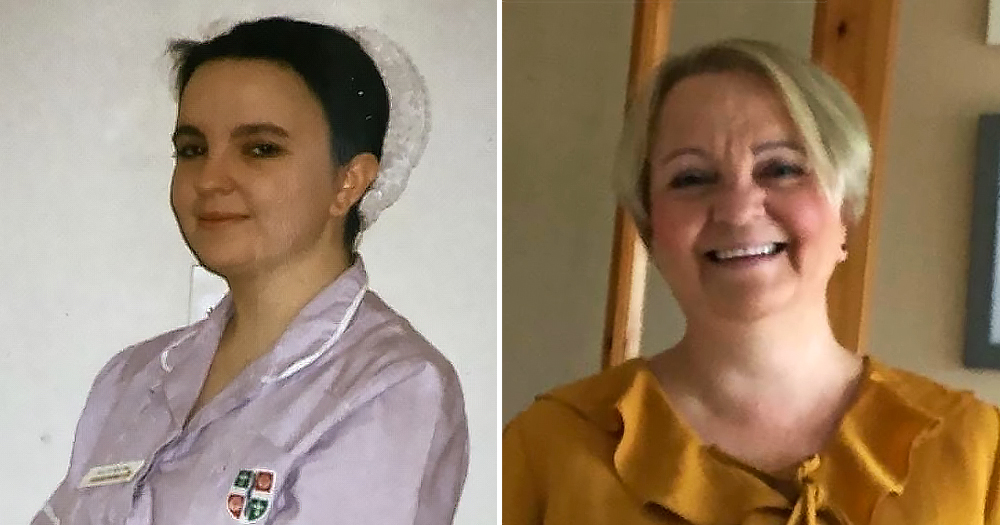Irish woman, Collette McGlynn, worked as a nurse caring for those with HIV/AIDS at the height of the crisis. She speaks here with Joe Drennan.
Channel 4 miniseries, It’s a Sin, has brought stories from the AIDS crisis of the 1980’s back to our screens, starting a new conversation amongst younger generations of queer people around the world. An eye-opening reminder of the horrors faced by our community, it also got me thinking about the intrepid efforts of nurses and doctors who fought to get the epidemic under control and others who have since devoted most of their careers to finding new treatments.
I had heard a story through a dear friend of mine about how her aunt had worked closely with patients suffering from HIV/AIDS. My friend’s aunt, Collette, was kind enough to agree to an interview over Zoom, sharing a unique, and often untold perspective of the crisis. We had an insightful conversation about her experiences, the stigma around sexual health and, ultimately, her advice for the younger queer community.
Collette McGlynn lives with her son Eli in the same small Laois village as I do. She began her career as a nurse having left Ireland the day after finishing her Leaving Certificate to study in England.
“To be honest, nursing was a ticket to somewhere else,” Collette shared. “It wasn’t a grand desire to care for anyone or be holier than thou. I got to go to England and I had somewhere to live. Nursing was a means to get away, that’s all. I didn’t have any burning desire to be Florence Nightingale or anyone like that. It was a job!”

After finishing her degree, Collette qualified as a clinical nurse specialist in blood disorders. Working in the medical ward at Luton and Dunstable hospital, this is where she was first introduced to patients suffering from HIV/AIDS. “I would’ve heard about it, but I didn’t know anyone who had it. Like to be honest, I didn’t even know anyone who was gay before I went to England.
“I was maybe 32 years of age before I knew that someone where I’m from was gay. It just wasn’t talked about.”
The coverage of the AIDS crisis in the media, and judgemental public opinion, both upset Collette. “I hope the media have learned some lessons,” she shared. “Back then it was like, ‘you’ve done a bad thing,’ or that you were morally corrupt because you had HIV. Subsequently, I worked with people who weren’t gay, who had HIV for lots of different reasons. Judgements were made in the beginning by the media and I hope it’s changed now, but we still do see the media stigmatising certain groups like the Traveller and Roma communities.”
Collette continued, “There was such a stigma to being gay. I looked after a young man whose lover was an older man, in the end they both died of AIDS, but neither families would talk to them. The older man’s children hated him, they were so vitriolic against him, and the younger man’s family disowned him. There was such a nastiness to how people were treated.
“AIDS definitely taught me empathy. To put myself in someone else’s shoes, who has a completely different life to me, and to stop being so judgemental.”

In 1996, Collette was working in Kenya, and immediately noted the disproportional effects of HIV/AIDS on marginalised groups. “All they got was a Brufen and a bit of cream for their skin, that was all the treatment they could have. Even within the treatment of AIDS, it’s very different among different groups, like if you’re poor and black, the way AIDS affected you was a lot different than if you were a rich white gay man.
“There were thousands of people dying in Africa, whole generations of men and women dead and there was just the young children and the older grandparents left.” As Collette points out the disproportionality, it is imperative that we not only appreciate the major advancements in HIV/AIDS treatment, but also do what we can to curb the crisis globally in developing countries.
On the topic of safe sex, Collette is uncompromising in her stance that it is something to be openly discussed, and shared her concern that younger generations seem to have a more lax attitude towards it. With renewed conversations about the crisis, Collette elaborated, “Hopefully, it made people think more about having safe sex, but I think that’s dropped off with most of the younger generations. I hope that people don’t forget the basic message, if you’re having unprotected sex, it’s not just HIV, it could be other sexually transmitted diseases.”
Collette encouraged people to be regularly tested for HIV. “That’s a conversation we need to have. I think it’s necessary, I think it should be like getting diesel for your car. You’d hope we get to a point where it’s normalised.”
She noted that the current heteronormative approach to sex education in schools is not only outdated, but obsolete. “There’s such fluidity around sex and it’s not a one-size-fits-all. I really don’t think that people take their sexual health seriously enough, regardless of HIV/AIDS. I’m already talking to my son, who’s seven, about consent like, ‘Did you ask Amber for a hug?’ You’re trying to bring ideas in, so they know.”
Collette added, “I hope to God by the time my son is in secondary school that they’ve copped on enough to have a proper conversation about sexual health. That includes consent.”
© 2021 GCN (Gay Community News). All rights reserved.
Support GCN
GCN is a free, vital resource for Ireland’s LGBTQ+ community since 1988.
GCN is a trading name of National LGBT Federation CLG, a registered charity - Charity Number: 20034580.
GCN relies on the generous support of the community and allies to sustain the crucial work that we do. Producing GCN is costly, and, in an industry which has been hugely impacted by rising costs, we need your support to help sustain and grow this vital resource.
Supporting GCN for as little as €1.99 per month will help us continue our work as Ireland’s free, independent LGBTQ+ media.
